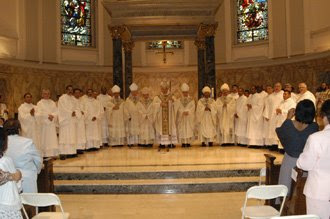One of the sharp dividing lines between some Christians is when, exactly, to celebrate Easter.
Now, efforts are under way to erase that line:
Christianity’s largest ecumenical movement expressed hope Thursday that churches were moving closer to a common Easter for the world’s Christians, despite a historical debate nearly as old as the religion.
Catholic and Protestant congregations will celebrate their belief in Jesus’ resurrection on the same day as Orthodox churches in 2010 and 2011 because of a coincidence in the Julian and Gregorian calendars. The common holiday has happened three times this decade.
But the World Council of Churches says consensus is emerging that these should not just be occasional occurrences.
At a recent meeting in Lviv, Ukraine, theologians representing nearly the breadth of Christianity agreed in principle on a strategy for all the faithful to continue observing their feast together.
“It’s not a problem of principle, of dogma or of doctrine,” said Juan Michel, spokesman for the council, whose 350 Protestant, Orthodox and other churches represent more than 560 million Christians. It cooperates with the Roman Catholic Church, which is not a member.
“It’s more of a pastoral issue for some churches,” said Michel. “There are concerns how the faithful will feel if there is a change in the traditional way of calculating the date.”
The confusion over Easter’s historical date arose in the early days of Christianity as the faith spread and different groups interpreted the four Gospels in different ways.
According to Matthew, Mark and Luke’s Gospels, the last meal Jesus shared with his disciples was the Jewish Passover meal, while John’s Gospel says that Jesus died on the feast of Passover itself.
Christianity’s leading authorities first sought to establish a common date in 325 at the Council of Nicaea, determining it as the first Sunday after the full moon following the spring equinox.
The problem before the advent of modern astronomy was calculating the equinox. Orthodox churches use March 21 in the Julian calendar, but since the 16th century the Western date has been derived in the Gregorian calendar. The resulting difference can be up to five weeks apart.
The council said theologians from the Vatican and various Orthodox and Protestant churches endorsed a compromise on May 15 that Easter should be held for all Christians using an equinox based on accurate astronomical data.
Under the plan the unified Easter usually falls as it would under the Gregorian calendar used by Catholics and Protestants, said Dagmar Heller, an ecumenical professor in Switzerland heading the council’s faith and order commission.
In the next 15 years, the only time Western churches would have to change Easter is in 2019 from April 21 to March 24. The bigger adjustment would be for the Orthodox Church, which has experienced several schisms in its history over the question of dates.
Check out the link for more.

